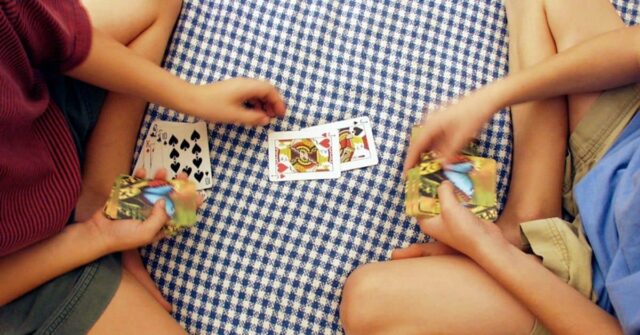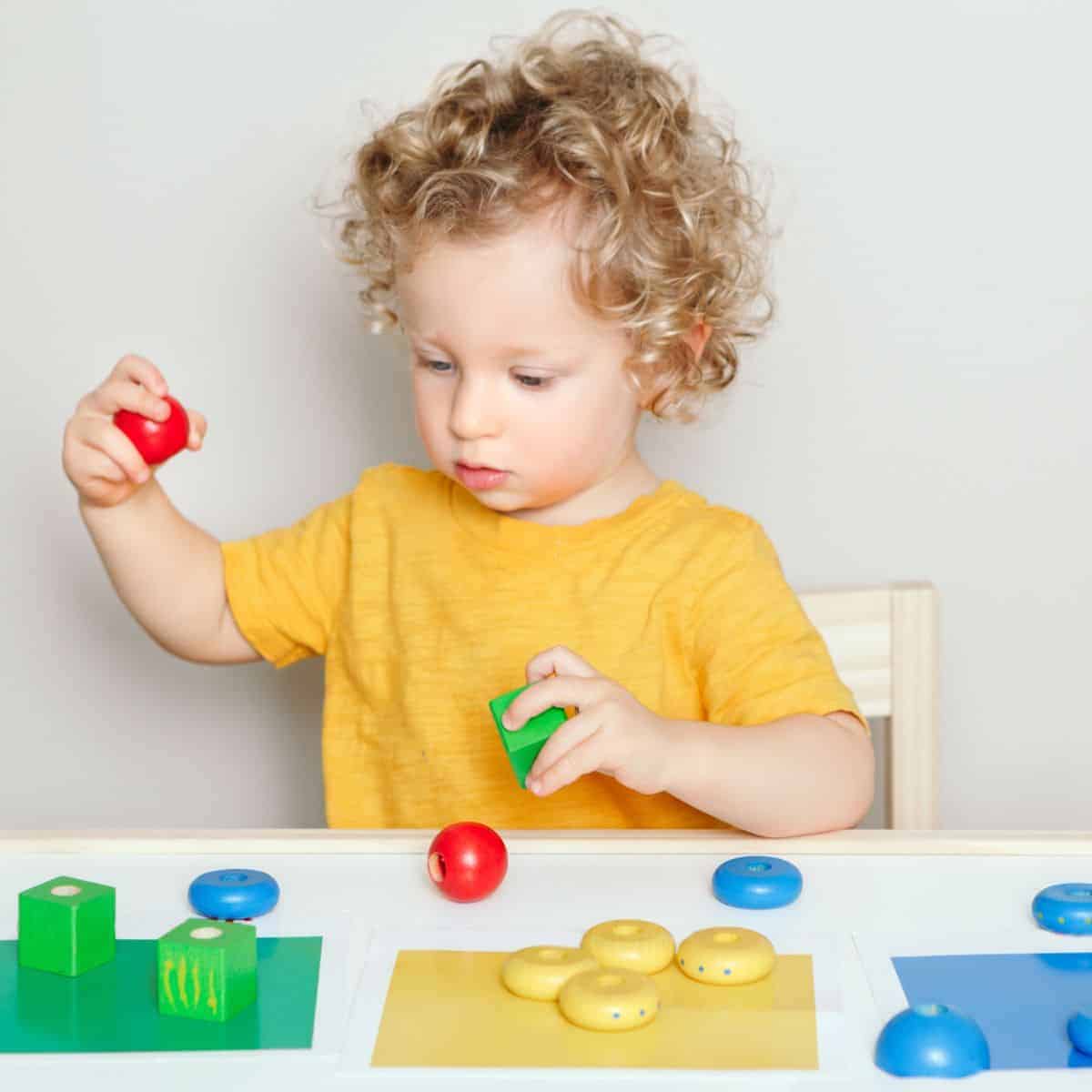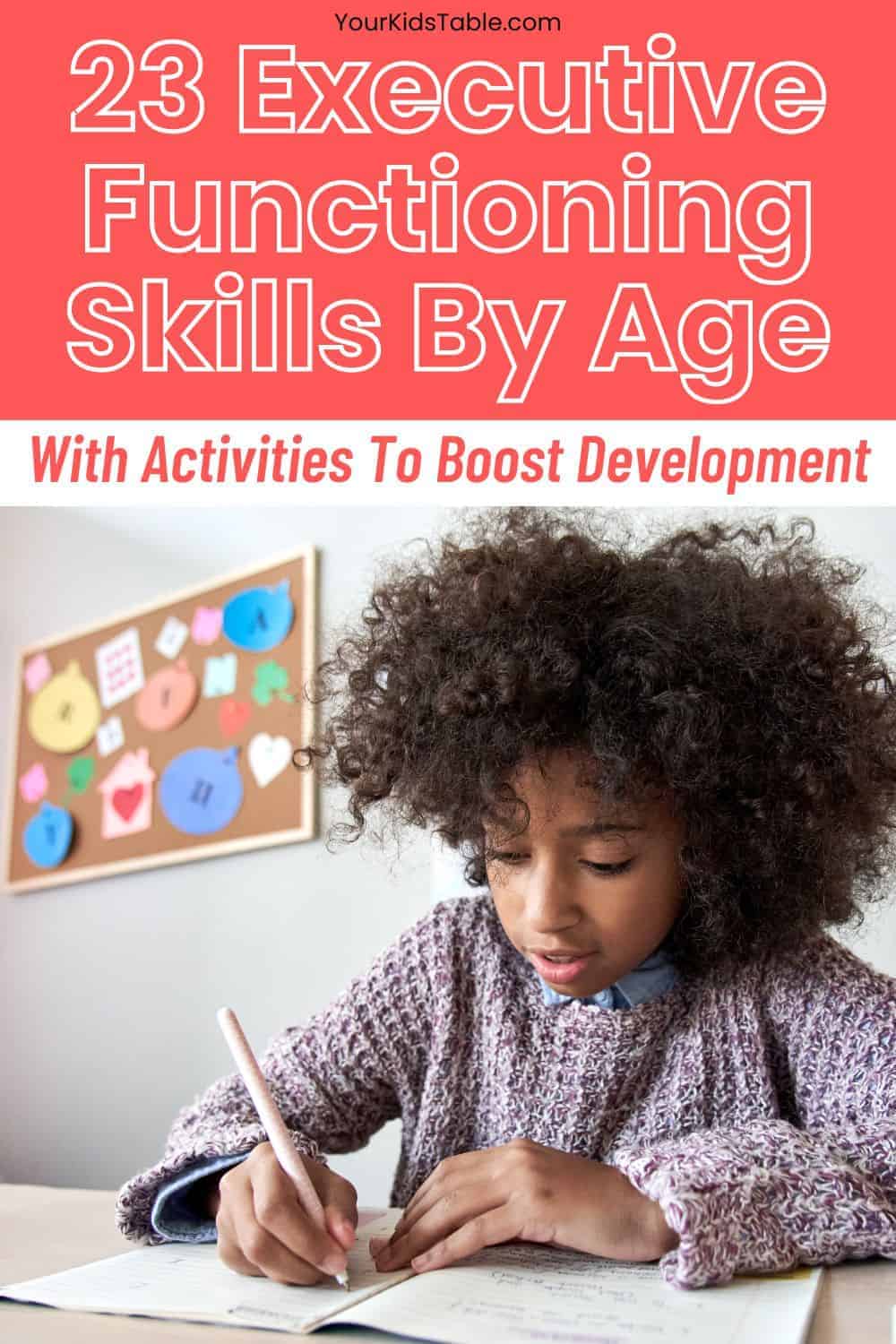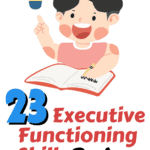Learn key executive functioning skills by age, and engaging executive functioning activities to boost development for toddlers, kids, and teens!
Affiliate links used below. See our full disclosure.
Tommy had a friend from school over for the very first time. His first real playdate.
His mom set him and his friend up with some snacks and a game of Uno. It’s a game he’s played quite a few times during family game nights with his parents and older brother.
Everything seems to be going well! The boys are laughing, playing, and eating. His mom pokes her head in the room later and notices that Tommy is about to play a reverse card. He’s never played that card with just two players before.
She wondered if he’d know what to do.
As he’s playing the card, all of his other cards fall out of his hand. He tries to pick them up. While he’s doing that, his friend asks if it’s his turn yet.
Tommy suddenly slams all the cards down on the table and storms out of the room. Then, he runs upstairs crying.
Tommy’s mom was really hopeful about this playdate…what just happened?
Why did he get so upset just because of a simple question?
Tommy was focusing all his energy on planning out his next move, remembering what card he just played, and whose turn it was. He became really frustrated when all the cards fell out of his hand. Tommy completely lost focus of the game.
When his friend asked him a question, his emotions took over because answering him was one more thing to process.
Tommy was struggling because his executive functioning skills weren’t working too well.

What Are Executive Functioning Skills?
Executive functioning skills are a variety of neurological processes that develop in the frontal lobe and are required to complete more complex tasks. As a child gets older, these skills become more in demand.
Executive functioning skills are responsible for:
- Impulse control
- Emotional regulation
- Task-initiation
- Flexible thinking (cognitive flexibility)
- Planning and problem solving
- Self-awareness/monitoring (metacognition)
- Self-control
- Working memory
- Time management
- Organization
During a simple game of Uno, almost all of these skills are needed.
You need impulse control to take turns, task-initiation to start your turn, flexible thinking to respond to the other player’s move, planning and problem solving to decide on your next move, and self-awareness/emotional control to be able to deal with losing.
It can be really overwhelming for a child who hasn’t developed one or more of these skills!
Why Do Executive Functioning Skills Matter?
Executive function helps kids understand and appropriately interact with the world around them.
As kids get older, they need executive functioning skills to socialize with others, remember assignments, prioritize which work to do first, and to keep their emotions under control when frustrated with a teacher or a friend.
And kids with sensory processing difficulties, those with ADHD, Autism, and even those with no obvious diagnosis often struggle with these skills.
When a toddler gets frustrated, you might see them push or hit their mom or a friend. As children get older, we expect them to be able to deal with their frustrations in more constructive ways. But sometimes the skills haven’t been developed in order for them to do that.

Key Milestones: Executive Functioning Skills By Age
Milestones are a helpful guide when we consider a child’s development, but it’s important to remember that they are just a guide. There are a lot of factors that can cause a child to be delayed or reach a milestone later than expected.
As you look through these executive functioning skills by age, from babies to toddlers to elementary aged kids to teens, focus on what skills are emerging and support those. Or, look for skills that may have never developed.
In a few minutes you’ll learn some engaging and simple activities that strengthen executive functioning skills.
Here is the list of executive functioning skills by age:
- 0-12 months
-
- Initiate playing with toys (task initiation)
- Getting caregivers attention when sad (emotional regulation)
- Object permanence (around 8 months, working memory)
- Looking to find a hidden toy (problem solving)
- 1-3 years
-
- Climbing stairs to go down a slide (problem solving)
- Building a tower with blocks (time management, flexible thinking, task initiation)
- Playing near and with friends (emotional regulation, organization)
- Following directions to help get themselves dressed (planning, flexible thinking, task initiation, self-awareness)
- 4-5 years
- Using imagination (games like playing house, castle, or trains)
- Picking out own clothes to help get themselves dressed
- Playing games with others
- Building more complex structures like putting together simple Lego sets
- 6-12 years
- Completing school assignments
- Playing on a sports team
- Playing a board game
- Packing own lunch
- Starts to use a planner and tracking deadlines
- Understands concept of time and can use timers to monitor the passage of time
- Able to identify problems in social interactions as well as academics and come up with several solutions
- 12+
- Cooking a meal
- Managing and completing homework in several different classes
- Managing personal money, spending and saving
- Identifies what helps them learn such as visuals, audio, repetition, etc.
How to Encourage Improvement of Executive Functioning Skills
Building your child’s executive functioning skills can seem like an overwhelming task. But it doesn’t have to be.
You can encourage these skills through activities you’re doing, like letting them help you in the kitchen or playing some of the games while you’re waiting in line at the grocery store.
Of course, you can also set aside time to work on these skills specifically, but most children will respond best when these activities are shared with you and playful.
You can get down on the floor and play pretend with them or bring them outside for a game of catch.
For older kids, family game nights are a perfect way to encourage these skills.
Once you start to recognize what executive functioning skills your child needs help with, you may be surprised how easy it is to incorporate it into your day.
Take a look at the following specific ways you can work on building executive functioning skills through play and daily activities.
Activities to Promote Executive Functioning Skills
- 0-12 months
- Peek-a-boo
- Holding your baby when crying for co-regulation
- Talking and smiling with baby
- Looking at books together
- 1-3 years
- Encouraging imaginative play
- Activities at a playground (getting on a swing, going down a slide)
- Starting to help put on clothes
- Looking through books and retelling stories
- Singing songs
- Repeating nursery rhymes
- 4-5 years
- Search and find games
- Simple memory game
- Building with train tracks
- Following directions to make a craft
- 6-12 years
- Board games (start with cooperative can be helpful, Peaceable Kingdom Games can be a great option)
- Following a baking recipe
- More complex Legos
- Using a vending machine
- Age appropriate crafts with multiple step directions
- Purchasing a few items in a store with adult supervision
- 12+
- More complex board games with strategy
- Meal planning
- Grocery shopping
- Planning a trip or activity together
- Craft or construction projects

Kids With Executive Functioning Skills Often Are Mislabeled as “Bad”
Kids with executive functioning challenges often have trouble with impulse control, completing tasks, or getting along with peers. It can seem like they don’t listen, they’re trying to “push your buttons” or they aren’t a good friend.
Classrooms can be especially challenging for children who are struggling with executive functioning skills.
Almost all executive functioning skills are needed for a child to be successful in a classroom. When a child also struggles with sensory issues, then they have the additional challenge of trying to stay regulated.
Unfortunately, this can cause others to mislabel them as “bad”.
Identifying your child has executive functioning skill delays can help explain their behavior to others while you address strengthening these skills.
How to Get More Help for Kids With Executive Functioning Skill Difficulties
When you notice your child is struggling with these skills, it can be difficult to know what to do next! All of these activities are great to try at home. If you notice they’re still struggling, reaching out to their teacher or doctor is a great next step.
Occupational therapy can be extremely beneficial for kids with executive functioning skill difficulties!
OTs have been trained to be able to identify these difficulties and help your child build skills.
But, you can also go deeper and learn more specific strategies for how to improve attention, memory, organization, and even self-control in this powerful workshop:
The Brain Boss: Strategies for Executive Functioning Skills in Kids
More Developmental Activities for Your Child
3 Quick Tricks That Improve Fine Motor Skills
5 Fine Motor Activities to Get Kids Ready for School
Visual Perceptual Activities: 4 Ways to Boost Your Kids’ Development
Easy Obstacle Course to Improve Handwriting
Andrea Timler is a licensed occupational therapist and part of the Your Kid’s Table Team. She has over 7 years experience with expertise in development and feeding in babies, toddlers, and children. Andrea also has 4 kiddos of her own at home.
Alisha Grogan is a licensed occupational therapist and founder of Your Kid’s Table. She has over 19 years experience with expertise in sensory processing and feeding development in babies, toddlers, and children. Alisha also has 3 boys of her own at home. Learn more about her here.



This is an interesting topic.
Glad to know it’s helpful!
Best,
Andrea